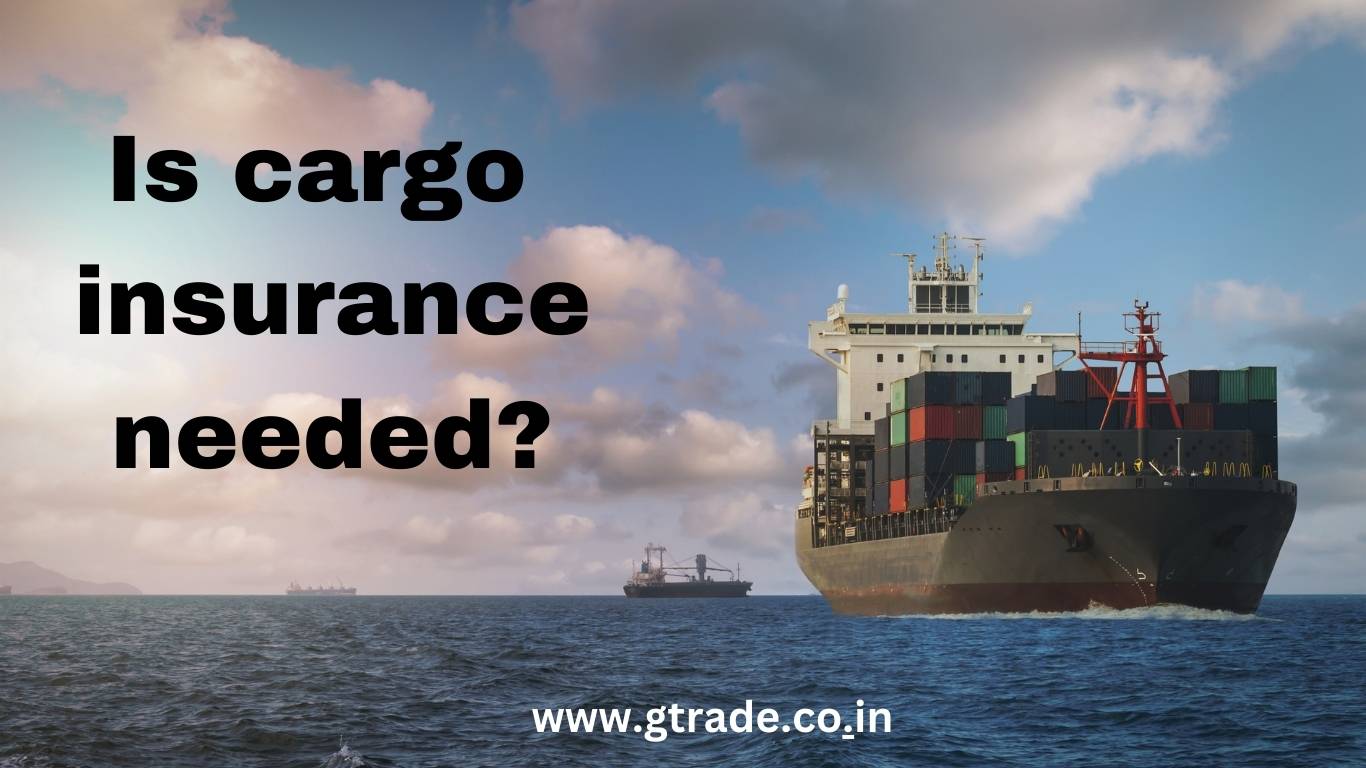Is marine and cargo insurance the same?
Marine insurance is another variant of the general term ‘insurance’ and, is designed to manage risks in the event of unfortunate incidents like accidents, damage to the maritime property such as ships, crew, cargo, terminal ports, offshore installations and floating equipment and loss of life. Marine insurance can be broadly classified into cargo insurance and hull insurance.
A) Cargo insurance covers the loss or damage to goods during transit by sea, air, or land. Cargo insurance is a subset of marine insurance which also covers the machinery and crew involved in shipping.
B) Hull insurance covers the physical damage to the ship or vessel, including machinery, equipment, and other parts.
| Includes | Marine insurance | Cargo insurance |
|---|---|---|
| Hull Insurance | Yes | No |
| crew liability | Yes | No |
| ship or carrier damage | Yes | No |
| damages to port and termianl handling equipment | Yes | No |
| loss of goods in transit | Yes | Yes |
(FAQs) on cargo insurnace
What is cargo insurance in shipping?
Cargo Insurance: Cargo insurance protects the cargo owner against damage or loss of cargo due to ship accident or due to delay in the voyage or unloading. cargo insurance provides essential protection for cargo owners and shippers against the risks associated with transporting goods by sea, air, or land.
cargo insurance also called as Transit Insurance. Cargo insurance covers goods between points of origin to the final destination across all means – roads, railways, air, and sea.
Why do you need cargo insurance?
ocean freight is exposed to a lot of risk, bearing huge losses as it moves through different ports. These losses can result in significant financial damage to the parties involved, making cargo insurance crucial to minimising the financial impact.The cargo insurance policy covers loss or damage to the cargo due to various risks, including natural disasters like storms, lightning, and earthquakes, and man-made risks like theft, fire, and piracy
Are carriers or freight forwarders liable for the damage of cargo during transit?
Though the carrier or frieghtforwarder are legally liable, their limit is usually less than the value of goods that are commonly shipped. Ocean freight carriers are liable for only up to US$500 per package/shipping unit or the actual value of the goods, whichever is less. Air freight carriers, are only liable for 19 SDR (~US$24) per kilogram. Based on the above you could still lose a significant revenue without any cargo or freight insurance.
It’s important to look at the incoterms of your contract because certain incoterms, remove the burden from you at certain points in the shipping process. Determining the full scope of the contract allows you to save money because you only pay for insurance when it’s needed.
How to select the right type of cargo insurance?
The cargo insurance types vary depend upon depending on the mode of transport that is involved in transfer of goods from point A( exporter`s wasrehouse) to point B(consignee’s named place).
If the the cargo has been delivered through multimodal transportation, it is important to take insurance coverage for all the three modes of Transportation until the cargo is delivered to the named place of the consignee.
the multiple modes of Transportation includes the following three types:
- Road or surface transportation insurance(rail and truck)
- Air transport insurance
- sea or inland water transport
When you take an insurance contract, an exporter must be insured for the entire journey, regardless of what transport modes are used in between.
what is covered under cargo Insurance policy?
Transit insurance offers comprehensive coverage for goods during their transportation. This includes protection against a range of potential risks:
| Natural disasters | Earthquake or volcanic eruptions, floods, storms |
| Man made calamities | Fire, explosion and lightning |
| Both to Blame collisions | Accidents and Collisions between vehicles |
| sinking or capsizing of ship | Overturning or derailment of vehicle due to rough weather. |
| Loading and Unloading Risks | Damages suffered during loading and unloading |
| Accidental Damages | Theft/pilferage, malicious damage |
| Pirate attacks | Hijack of goods |
| Jettison | The act of throwing cargo or equipment overboard to lighten a ship’s or vessel’s load and prevent it from sinking or capsizing. |
This comprehensive coverage ensures that goods are shielded from potential risks and eventualities during transit.
What is not covered under cargo insurance policy?
exclusions: cargo insurance policy, doesn’t cover the following
| Inherent Vice | refers to damages caused by inherent nature of goods. such as, unstable chemical compounds that could lead to an explosion |
| Latent Defects | minor defects in a product that wouldn’t be easily noticed upon inspection. For instance, welds showing cracks due to improper manufacturing would be excluded. |
| Loss Due to Improper Packaging | If cargo is damaged due to improper packaging, it won’t be covered by insurance |
| Willful Misconduct By Assured: | The damages caused by intentional misconduct or fraud by the insured party are not covered. Example: importing damaged goods to make a fraudulent claim. |
| Unexplained Loss Or Shortage | If goods are lost or stolen from a vehicle owned or operated by the insured, it’s excluded. |
| Nuclear weapons | Loss or damage arising from the use of any nuclear weapons during transit |
| Leakages | Ordinary leakages in case of liquid cargo |
| Ordinary wear and tear | ordinary leakage, ordinary loss in weight or volume, or ordinary wear and tear of the goods insured |
| Damage by rats and vermins | damage of goods in containers infested with rats and vermins |
| Insolvency of carrier | A financial Default of charterers and operators of the ship |
| Non-seaworthiness of the vessel or craft | unfitness of vessel, conveyance container, or liftvan for the safe carriage of the goods insured. |
| war, civil war revolution | rebellion insurrection, or civil strike arising therefrom, or any hostile act against a dominating power. |
| Strikes Exclusion | delay or damage of cargo, resulting from strikes, lock-outs, labour disturbances, riots or civil commotions |
what are the cargo in insurance clauses in shipping?
The cargo insurance policies are defined under various clauses which include Institute cargo classes for international trade and transit clauses for inland transportation within a country. There are other specific cargo clauses catering to the needs of the exporter.
| 1 | Institute Cargo Clause (A) |
| 2 | Institute Cargo Clause (B) |
| 3 | Institute Cargo Clause (C) |
| 4 | Malicious Damage Clause |
| 5 | Institute Theft, Pilferage, Nondelivery Clause |
| 6 | Institute Replacement Clause |
| 7 | Replacement Clause (Second Hand Machinery) |
| 8 | Label Clause |
| 9 | Pair and Set Clause |
| 10 | Institute War Clause (Cargo) |
| 11 | Institute Strikes Clause (Cargo) |
| 12 | Institute Cargo Clause (Air) (excluding sendings by post) |
| 13 | Institute War Clauses (sendings by post) |
| 14 | Institute War Clauses (Air Cargo) ( excluding sendings by post) |
| 15 | Institute Strikes Clause (Air Cargo) |
| 16 | Institute War Cancellation Clause (Cargo) |
| 17 | Institute Classification Clause |
| 18 | Inland Transit (Rail or Road) A – All Risks |
| 19 | Inland Transit (Rail or Road) B – Basic Cover |
| 20 | Inland Transit (Rail or Road) C – Fire Risk |
| 21 | Inland SRCC Clause |
| 22 | Inland Transit (Inland Vessels) Clause |
| 23 | Sailing Vessels Clause |
| 24 | Important Notice |
| 25 | Duty Clause |
| 26 | Increased Value Insurance Clause |
| 27 | Institute Radioactive Contamination Exclusion Clause |
| 28 | Terrorism exclusion clause |
Summary :Understanding tne cargo insurance coverage depth, risk assessment and policy options help businesses choose the right coverage for their unique cargo and shipping needs.

